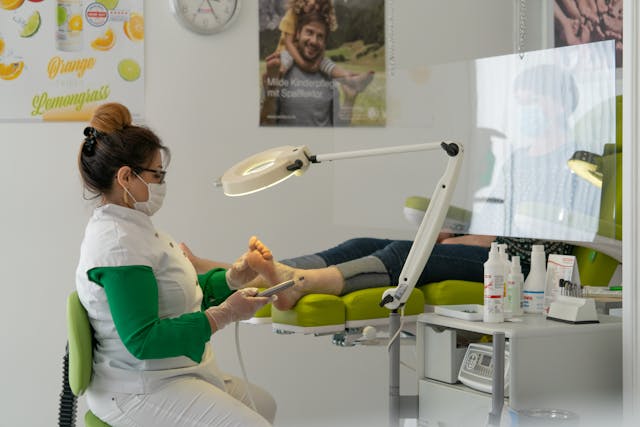
Whether it’s ongoing discomfort or curiosity about maintaining healthy feet, a visit to a podiatrist can be a step toward better foot care. Knowing what to expect at your initial appointment can help you feel more prepared and relaxed. Below, we’ll walk you through what a podiatrist does, what your first visit might involve, the role podiatry plays throughout life, and when you should consider seeing a specialist.
The Role of a Podiatrist
A podiatrist is a healthcare professional specializing in diagnosing and treating conditions related to the feet, ankles, and lower extremities. Some common issues they address include heel pain, bunions, ingrown toenails, sports injuries, and diabetic foot care. They are trained to identify and treat a wide range of conditions, often helping patients walk more comfortably or prevent future complications. Podiatrists undergo years of education and training, which often includes earning a Doctor of Podiatric Medicine (DPM) degree and completing residencies in hospitals or clinics. This expertise positions them to guide you through maintaining the health and functionality of your feet.
What to Expect at a First Appointment
Your first visit to a podiatrist is an opportunity to outline your concerns and gather information about your foot health. The appointment will typically start with questions about your medical history, any symptoms you’re experiencing, and your daily routine. If you’re visiting because of pain or an injury, be ready to share when the issue began, what may have caused it, and how it affects your mobility.
A physical examination will likely follow, where the podiatrist evaluates your feet, ankles, or gait to identify potential concerns. Sometimes, they may request X-rays or other diagnostic tests to get a clearer picture of the issue.
Based on the findings, the podiatrist will discuss a treatment plan tailored to your needs. These could include exercises, custom orthotics, or referrals to other specialists. The first appointment is also good time to ask questions. Your podiatrist can explain common foot health practices, what to watch for as you age, or what footwear best supports your lifestyle.
The Role of Podiatry Through All Stages of Life
Foot health changes as we move through different stages of life, and podiatry adapts to meet those evolving needs. Young children might see a podiatrist to address developmental conditions like flat feet or to help with proper footwear for active play. Teenagers and young adults often visit for sports injuries or issues stemming from high-impact activities.
For adults, podiatry can address conditions caused by years of wear and tear, like plantar fasciitis or bunions. Additionally, seniors often benefit from podiatric care for age-related issues, such as arthritis or reduced circulation that impacts foot health. Understanding how podiatry evolves with your body helps underscore its value in maintaining your overall health, no matter your age.
When to Seek Foot Care From a Specialist
Not every foot ache requires a specialist, but some situations do call for professional care. You might want to see a podiatrist if you’re dealing with persistent pain or discomfort that doesn’t improve after rest or over-the-counter treatments. Similarly, injuries like sprains, fractures, or infections that worsen need attention. Other times, foot changes like swelling, numbness, or discoloration could signal underlying health concerns that extend beyond your feet. People managing chronic conditions such as diabetes may especially benefit from regular appointments to prevent complications, including ulcers or nerve damage. If something feels off or hinders your ability to enjoy daily activities, don’t hesitate to reach out to a podiatrist for help.
Also Read: How Hammer Toe Treatment Options Can Restore Comfort and Mobility?
Take the Next Step Toward Healthy Feet
Visiting a podiatrist for the first time can be an informative and reassuring experience. From understanding your unique foot structure to addressing specific concerns, podiatrists play a key role in helping you stay mobile and comfortable through every stage of life. If you’re experiencing pain, an injury, or are overdue for specialized foot care, schedule an appointment today.








